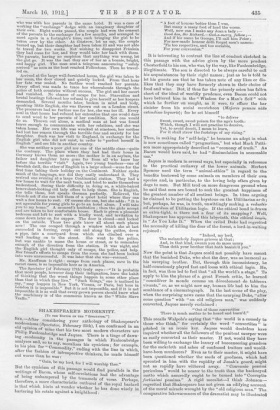THE WHITE SLAVE TRAFFIC. [To THE EDITOR OP THE "SracTrron."]
SIR,—May I beg you to give space for the following P—I am, May I give two instances of recent date to show that the "White Slave Traffic" exists in England P The "procurers" in the first case played the role of a charming, respectable married couple, and visited various foreign holiday resorts. At one of these the experienced ponces" marked down their victi;e,, who was with her parents in the same hotel. It was a case of working the "exchange" dodge with an imaginary daughter of their own. Eight weeks passed, the couple had won the consent of the parents to the exchange for a few months, and arranged to meet again in a fortnight's time, each bringing the girl to be taken over by the other. At Gastrow, let u. s say, the couple turned up, but their daughter had been taken ill and was not able to travel for two weeks. Not' wishing to disappoint .Fraulein they had come for her, and they would take her back with them. The parents, having no suspicion that anything was wrong, let the girl go. It was the last they saw of her as a bonnie, bright,
and happy girl. The man sent a telegram announcing "safely arrived" as soon as the boat reached Folkestone. Then he travel- led on.
Arrived at the large well-furnished house, the girl was taken to her room, the door closed and quietly locked. From that hour her fate was sealed. No further word reached her parents. Every effort was made to trace her whereabouts through the police of both countries without success. The girl and her escort had vanished. No chance of escape for her. Starvation and brutal beatings followed her refusal to give herself as her keepers demanded. Several months later, broken in mind and body, speaking little English, she was thrown out on a London street. The procurers had no further use for her, she was too ill. Every soul in that house had refused her entreaties that one would dare to send word to her parents of her condition. Not ono would do so. Thrown out alone, a medical man at last was found brave enough to communicate with her relations, and she was taken home. Her own life was wrecked at nineteen, her mother had lost her reason through the terrible fear and anxiety for her daughter. Such was her visit to England, in exchange for the English girl who did not exist, in order to "perfect herself in English" and see life in another country.
She was neither a poor girl nor one of the middle class—quite the contrary. The place where they had had their home in Germany knows them no more : the mother is in an asylum, the father and daughter have gone far from all who know her before the terrible "visit." Again, two young teachers—one of Swedish drill, the other of English in a large school—were for the first time taking their holiday on the Continent. Neither spoke much of the language, nor did they easily understand it. They arrived one evening at a large Continental station. They had a few hours to wait for the next train, and tried to make themselves understood. Seeing their difficulty in doing so, a white-haired benevolent-looking old lady offers to help them. She is English, she tolls them, but speaks German perfectly. Relieved, the friends ask if she can tell them of a quiet hotel where they can wait a few hours to rest. Of course she can, but she adds "It is not agreeable for young girls to go to an hotel alone. I will take you to my home." A moment's hesitation ; then the girls accept and are taken to her comfortable house. Each is given a pleasant bedroom and left to rest with a kindly word, and invitation to come down later on for supper. The door is closed—and locked on the outside. Those two girls know all about such places
now ! The one escaped through a window which she at last succeeded in forcing, crept out and along the gutter, down a pipe, into a courtyard from which she climbed over a wall leading on to the street. She went to the police, but was unable to name the house or street, or to remember enough of the direction from the station. It was night, and the English girl thought only of escape, the police, and help. Her friend's efforts to escape from the room she had been looked into were unsuccessful. It was later that she was—rescued.
Mr. Kauffman is right : escape from such places, save in the rarest cases, is as impossible here as in America.
The Spectator (of February 17th) truly says :—" It is probable that most people, however deep their indignation, have the habit
of thinking that the worst things happen in some other place than that in which they live." "Such things," one is inclined to say, "may happen in New York, Vienna, or Paris, but here in London it is impossible." But it is not impossible, and if it is not impossible it is as well that every grown person should know what the machinery is of the commerce known as the "White Slave Traffic."











































 Previous page
Previous page